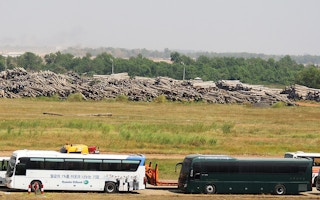Myanmar has enacted a national logging ban for one year and a 10-year logging ban in the Pegu Yoma region to protect the country’s vastly emaciated forests which have been pillaged by illegal logging groups for years.
To continue reading, subscribe to Eco‑Business.
There's something for everyone. We offer a range of subscription plans.
- Access our stories and receive our Insights Weekly newsletter with the free EB Member plan.
- Unlock unlimited access to our content and archive with EB Circle.
- Publish your content with EB Premium.
The ban was announced earlier this month and will stand until the end of March 2017, securing the country’s precious forest timber for one complete logging season.
Forest watchdog Environmental Investigation Agency (EIA), who has been vigilantly exposing the rampant exploitation of Myanmar timber under the previous military regime, met for the first time with MPs from the Parliament’s Natural Resources and Environment Ministry as well as with officials from the Forestry Department in Naypyidaw earlier this month, only five months after the new democratic government, of which Daw Aung San Suu Kyi is a part, took office on 30 March.
During the visit, EIA provided officials an update on how timber stolen from Myanmar’s frontier forests make their way unhindered into China, and how this has been going on for years at a rate of 900,000m3 of logs worth half a billion dollars illegally exported a year.
This is part of gross mismanagement and corruption in Myanmar’s logging and timber trade sector, mainly for high value timber species such as teak, padauk and Burmese rosewood, which has resulted in an environmental catastrophe for the country.
Myanmar suffers one of the world’s worst deforestation rates. Between 2010-15, it lost 546,000 hectares of forests, about 8.5 per cent of its forest cover; only Brazil and Indonesia have worse rates, reports IEA.
“
Of course, there is no one-policy solution to the problem and much work remains to be done, but this is a hugely encouraging and an optimistic place to start.
Faith Doherty, team leader, Environmental Investigatioon Agency Forests Campaign
Soon after the report’s release, the Chinese authorities announced a temporary suspension on wood trade across its land border with Myanmar.
This suspension remains in force and EIA research shows a steep decline in the volume of wood imported via official crossings, although some of the main syndicates involved allegedly continue to channel illegal timber through smaller inroads.
The EIA welcomes the ban as a major step forward towards forest restoration.
“This is a decision that demonstrates clear intent to tackle corruption within the forestry sector by Myanmar’s National League for Democracy-led Government,” Faith Doherty, team leader of EIA’s Forests Campaign, said.
Throughout the duration of the ban, Myanmar will use up to three years’ worth of available timber from its stockpile to satisfy local and international demands. Government-controlled Myanmar Timber Enterprise will manage the stockpiles.
EIA called on officials to exercise stringent controls over the management of the stockpiles to prevent illegally logged timber from being laundered through the system.
A further reform proposed by the Minister of Natural Resources and Environmental Conservation, U Ohn Win, will prohibit private companies from logging in the country. The MTE previously sub-contracted to private sector firms to carry out logging, many of which had close ties to the former military government which ruled for 50 years and which played a key role in over-harvesting.
“Of course, there is no one-policy solution to the problem and much work remains to be done, but this is a hugely encouraging and an optimistic place to start”, Doherty said.










